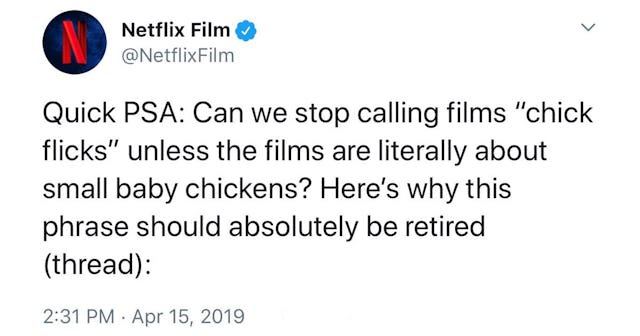Netflix Is Here To School Us On Why We Need To Retire The Term 'Chick Flicks'

Listen up, all you rom-com naysayers — “chick flicks” are for movies about chickens, period
Unless you’ve been under a rock for 20 years, you’ve likely heard the phrase “chick flick.” And, if you’re a book lover, “chick lit.” While these phrases might seem harmless and common, they’re actually pretty condescending and 100 percent sexist. And Netflix explained exactly why we need to retire “chick flick” from our colloquial vocabulary in a viral Twitter thread.
Basically, unless you’re watching a movie about literal baby chickens, we don’t need to use the term “chick flick” ever again.
Movies that typically fall under the category of “chick flick” are, surprise surprise, romantic comedies. Because of course, only humans with vaginas like romance! And we should make everyone feel shameful about liking romance, shouldn’t we? *Eye roll.*
Netflix is absolutely right here. My husband’s favorite movie of all time is The Princess Bride. He’s almost as obsessed with Tom Hanks/Meg Ryan movies as I am. He’s watched Love and Basketball more times than I can count. BECAUSE THEY’RE GOOD MOVIES. And, oddly, genitalia has nothing to do with that.
Yep, definitely haven’t ever heard anyone reference putting on a good “man movie.” Just like colors, movies are for everyone. They don’t have to be relegated to blue and pink categories. Nor do we need to make anyone feel guilty about the type of movies they like. *Cough — WOMEN — cough.*
Think about all of the romantic comedies you’ve watched and loved. Do you think Julia Roberts and Richard Gere weren’t expertly directed and edited in Pretty Woman and Runaway Bride? Or that we should cheapen the brilliant work of Meg Ryan and Billy Crystal in When Harry Met Sally, a film that has shattered money-making records and delighted viewers for 30 years, because it’s romantic in nature? Gimme a break.
“And nicknaming films ‘chick flicks’ drives home that there’s something trivial about watching them.” The same can be said for the term “guilty pleasure,” too. Have you ever in your life heard a man utter that phrase about the kind of movie or book he enjoys? NOPE. But women do, typically about romantic movies or romance novels.
To piggyback on the amazing point Netflix is making here, let’s get one thing perfectly straight: if you love something and it brings you joy — whether it’s a movie about a teenage girl who writes five letters to all the boys she’s loved before or a book about a handsome, rugged carpenter sweeping a betrayed divorcé off her feet in a small town — there is absolutely NOTHING to feel guilty about.
In romance movies and books (aside from the internal and external narrative conflict), the protagonist (usually a woman) is living her best life. She’s got friends, love, great sex. She’s finding herself and feeling herself. Relegating these stories to “chick flicks” and “chick lit” is just another way for the patriarchy to make us feel apologetic about finding happiness.
Escapism is a beautiful thing. Especially when you’re escaping into a world full of love and laughter — it makes us feel happy. That’s nothing to apologize for. Just enjoy it.
This article was originally published on